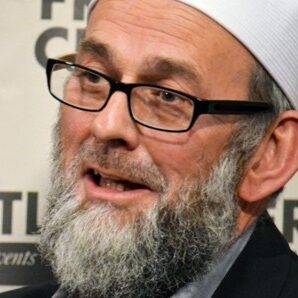As the Israelis and Palestinians try to agree on ceasefire terms in Cairo, public disgust at Israel’s savage military assault on the civilians of Gaza is growing. Such public disquiet is a worldwide phenomenon. At the University of Johannesburg on Wednesday evening, Professor Ilan Pappé told a packed auditorium that key people are still “blinded by the peace process” even though it is “not working and is not going to bring peace and justice” to the Palestinians. The key, he said, is a boycott of Israel.
The Israeli historian’s speech was part of a tour organised jointly by Muslim Views newspaper and BDS South Africa and, in Johannesburg, the university’s Palestine Solidarity Forum. The subject of Boycott, Divestment and Sanctions (BDS) against Israel was the main thrust of Pappé’s address, as well as that of South Africa’s Minister of Higher Education, Blade Nzimande. As far as the minister is concerned, support for BDA is essential because, quite simply: “Israeli apartheid is worse than South African apartheid.”
It was fitting that the meeting was held in “UJ”, the only university in the country to uphold an academic boycott of Israel, as the chair for the evening, Professor Farid Essack, was proud to announce. “Opponents of academic boycotts,” insisted Ilan Pappé, “have no idea what it is like to be a Palestinian academic or student in the occupied West Bank or Gaza Strip.” If they did, they would back a boycott.
Significantly, in this context, the Islamic University of Gaza, an institution with 30,000 students in 10 faculties, was bombed by the Israelis last week; it was not the first time that the IDF has chosen to bomb this particular academic institution. The world is waiting for the condemnation of this attack on academic freedom from Israelis and pro-Israel lobbyists. A boycott of their own institutions worries them more than the physical destruction of a Palestinian university. Such is the hypocrisy (an over-used word in this context, I know) of the pro-Israel lobby.
The parallels between Israel and apartheid South Africa are difficult to defend in the post-apartheid state. Although Essack had identified a few “Zionist colleagues” in the audience, and invited them to ask questions at the end, they remained silent. Perhaps they were afraid that the more vociferous of those present, who lambasted Minister Nzimande for their own government’s “lack of action”, would turn on them.
Pro-Palestinian demonstrations have been taking place all over South Africa in recent weeks, and a large turnout is expected in Cape Town on Saturday 9 August after an impassioned plea for participation from Kwara Kekana, the Head of Campaigns for BDS-SA. She is confident that the demonstration will be the biggest in the country since those calling for the release of Nelson Mandela more than 20 years ago.
Not unnaturally, there is a great deal of empathy for Palestine among activists and ordinary South Africans who have adopted the slogan, “Apartheid: not right for South Africa, not right for Palestinians” under which to struggle for peace and justice in the occupied territory. The words of Mandela still resonate with today’s anti-apartheid campaigners: “We know too well that our freedom is incomplete without the freedom of the Palestinians,” said Madeba. The late president was very loyal to those who supported the ANC’s armed struggle against the apartheid state, not least Yasser Arafat and the PLO.
According to Ilan Pappé, this is what makes South Africa such an important ally for the worldwide BDS campaign. “We need the [South African] government behind the movement, minister,” he told Blade Nzimande. South Africa, he continued, has to lead and show us a way that does not succumb to American Imperialism. “As well as an Arab Spring,” said Prof Pappé, “we need a US Spring and a Europe Spring,” in order to strip away immoral support for Israeli apartheid. “Make Israel a pariah state, a rogue state through BDS,” he urged. “That is far more moral and effective than any number of bombs.”
Judging by the reaction of the audience at the University of Johannesburg, they agreed with him, and BDS appears to have a strong future in South Africa. Companies like Woolworth, once South Africa’s equivalent of Britain’s Marks and Spencer, have been targeted for selling Israeli goods and protesters have already appeared outside its stores. The boycott is likely to extend to the company as a whole and not just Israeli goods that it sells; the same goes for other retailers who support Israel through trade. This is a reflection of recent similar action in the UK, for example, where major supermarkets have been boycotted for selling Israeli produce.
Entirely peaceful and a practical way for ordinary citizens to “do something”, the BDS campaign is growing worldwide, and Israel is worried. All the more reason for people to take to the streets, voice their opposition to Israeli apartheid and their support for justice for the people of Palestine; and then choose at least one, hopefully more, shop, product or item to boycott. It will make a difference.








